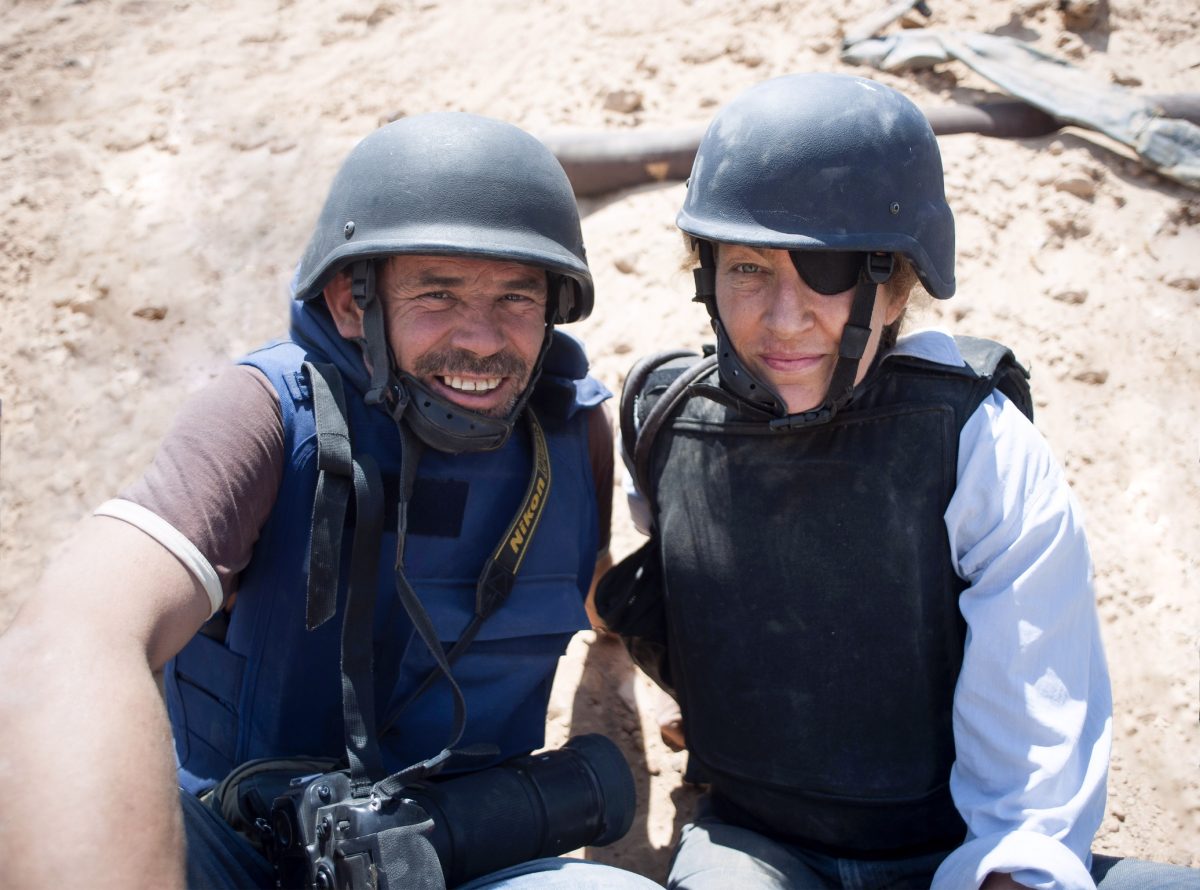
Dir.: Chris Martin; Documentary with Paul Conroy, Marie Colvin, Edith Bouvier, Wa’el, Dr. Abu Mohamed; UK 2018, 93 min.
Chris Martin’s first solo documentary feature is a moving tribute to New York born war correspondent Marie Colvin (1956-2012), who was killed in Homs, Syria together with French photographer Remi Ochlik.
Based on the book of the same title by photographer Paul Conroy, who worked in tandem with Colvin, this is a chronicle of a journey that began on February 13th 2012, when ex soldier Paul Conray, (“the army and me did on get on well”) turned photographer and accompanied Colvin to Homs. His testimony is central to the narrative. On route, they decided that once they had reached Homs, and were forced to leave the rebel stronghold, they would return ‘illegally’ to the city of slaughter, where President Assad’s forces shelled apartment blocks, and particularly the Press Centre in the district of Baba Amir.
Marie Colvin, who interviewed Muhammar Gaddafi in 1986 and 2011, was a decorated journalist, who had lost an eye whilst reporting in Sri Lanka on the Tamil underground war in 2001. She had worked for the Sunday Times since 1985, reporting extensively on the Arab Spring. Not always known for her tact, she often had difficulties working with male photographers, but her relationship with Conroy was a meeting of kindred spirits.
What angered Colvin and Conroy the most was the incessant shelling of the Syrian Army, which gave Homs’ population no chance: combined with snipers on rooftops, the bloodbath was endless. Helped by their journalist/translator Wa’el, the two interviewed Dr. Abu Mohamed, who was running a makeshift hospital in a cellar, performing surgery, often without anaesthetic, on kitchen tables.
Colvin reported live to the broadcasters of CNN, Channel 4 and the BBC. Immediately afterwards the targeted shelling of the Press Centre began. After Colvin and Ochlik had been killed on the 22th of February, Syrian State Radio announced that they were victims of the Rebels who had thrown a nail bomb into the building. But Conway is quite adamant about the shelling of the Press building a day after Colvin went on air to the international community. Soon Conway and Edith Bouvier found themselves on Dr Mohamed’s operating table in the cellar, being tended for leg injuries inflicted in the same attack which killed Colvin and Ochlik.
The final part of this documentary is the most harrowing. Both Bouvier and Conway needed to be looked after in a proper hospital, otherwise their situation would have become life limiting. When they heard that a Syrian controlled ambulance was on its way to transport them out of Homs, they had to make a decision. Warned that the collaboration was anything but friendly, both declined, as did another injured French journalist. Finally, Conway got smuggled out of Homs, through a tunnel, the only way the rebels got get food and medicines into Homs. Two days later Bouvier and her French college escaped through the same route.
Conway’s narrative is complemented by tributes from Lindsey Hilsum from C4 and Sean Ryan from The Sunday Times: yet never has the gulf between journalist and editors been wider. However, that is nothing compared with the fact, that six years later President Assad has won his dirty war against his own people.
UNDER THE WIRE is not for the faint-hearted: some of the images will remain seared to the memory: this is a modern version of Dante’s Inferno. AS ****